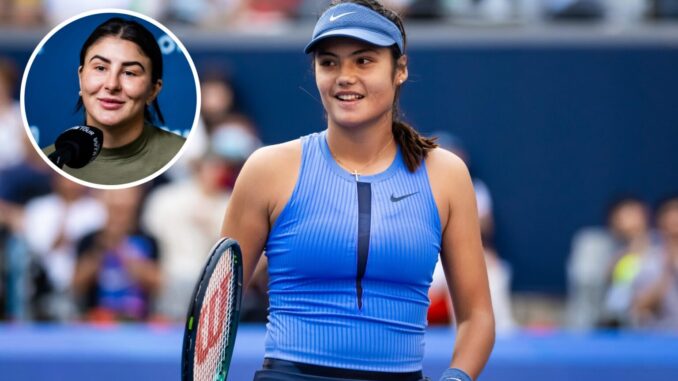
In the high-octane world of professional tennis, where triumphs and tribulations play out under the global spotlight, Emma Raducanu’s 2025 season has been a captivating tale of resilience and redemption. The 22-year-old Briton, whose fairy-tale 2021 US Open victory catapulted her to stardom, has weathered storms of injury, scrutiny, and sky-high expectations. Now, as the WTA tour’s Asian swing unfolds in the humid crucible of October, a fellow US Open champion, Sloane Stephens, has stepped forward to celebrate Raducanu’s recent surge, her words a heartfelt nod to a young star rediscovering her spark. “It’s great to see,” Stephens beamed, her praise a beacon of camaraderie in a sport often defined by solitary battles.
Raducanu’s journey since her Flushing Meadows triumph at age 18 has been anything but linear. Hailed as a generational talent after becoming the first qualifier to win a Grand Slam, she faced the daunting task of living up to her own legend. Injuries—wrist, ankle, and back issues—derailed her progress, while the weight of fame and a revolving door of coaches tested her resolve. Yet, under the steady hand of new coach Francis Roig, the world No. 30 has begun to turn the tide in 2025. Her Asian swing, a grueling gauntlet of tournaments across Seoul, Beijing, and Wuhan, has showcased flashes of the brilliance that once stunned the world. In Seoul, she pushed world No. 8 Barbora Krejcikova to the brink, holding three match points in a thrilling quarterfinal before falling in a third-set tiebreak. Days later in Beijing, she battled world No. 4 Jessica Pegula with similar ferocity, again squandering three match points in a heart-wrenching defeat. These near-misses, far from deflating her, have fueled a quiet fire, with Raducanu insisting she’s “staying positive” as she chases consistency.
Stephens, the 2017 US Open champion, has watched Raducanu’s resurgence with admiration, her perspective shaped by her own rollercoaster career. The 32-year-old American, known for her blistering baseline game and infectious charisma, has navigated her own peaks and valleys, from Grand Slam glory to ranking slumps and back again. Speaking ahead of her own Wuhan Open campaign, Stephens lauded Raducanu’s grit: “It’s great to see. She’s been through so much with injuries and everything else, and to see her playing this well again, fighting in these big matches, it’s really special.” Her words carry the weight of experience, a champion recognizing the intangible resolve it takes to claw back from adversity in a sport that spares no one.
Raducanu’s recent performances have indeed turned heads. In Seoul, her aggressive forehand and deft net play pushed Krejcikova to the limit, her 6-4, 6-7(4), 7-6(6) loss a testament to her refusal to yield. In Beijing, she traded blows with Pegula, her 6-4, 6-7(6), 7-5 defeat marked by moments of audacious shot-making—a crosscourt backhand winner that left the crowd gasping and a serve that clocked 115 mph. These battles, though losses, signaled a return to form, her movement sharper and her confidence blossoming. “I’m staying positive,” Raducanu said post-Beijing, her voice steady despite the sting of defeat. “I’m playing good tennis, and I know if I keep putting myself in these positions, the wins will come.”
Wuhan, with its WTA 1000 prestige and personal resonance—Raducanu’s mother hails from China—offered a chance to convert promise into points. Her first-round match against American qualifier Ann Li, however, collided with a brutal reality: a heatwave that pushed temperatures to 34°C (93°F) and humidity to 70%, creating a heat index that felt like 37°C. Raducanu started brightly, breaking Li to open, but the conditions took a toll. Trailing 6-1, 4-1, she called for a medical timeout, dizziness and elevated blood pressure forcing her to retire—her earliest exit since Indian Wells. Li, advancing to face Ekaterina Alexandrova, offered empathy: “I want to wish Emma a fast recovery. It looks like she wasn’t feeling good. It was a tough match last time [we played], so hopefully she feels better.” Stephens, too, acknowledged the conditions, noting, “It’s tough out there for everyone. You’ve got to look after yourself, and I know Emma will bounce back.”
The Asian swing’s punishing schedule has sparked broader concerns, with players like Iga Swiatek slamming its “overwhelming” demands. In Shanghai’s ATP Masters 1000, Jannik Sinner retired with cramps, Novak Djokovic battled nausea, and Taylor Fritz staggered through matches, all echoing Raducanu’s plight. Wuhan organizers, scrambling to adapt, adjusted the main court’s roof for shade and paused outer-court play, but the heat remained a formidable foe. For Raducanu, the setback is a stark reminder of tennis’s physical toll, yet Stephens’ praise underscores the bigger picture: her trajectory is upward. “She’s been through so much,” Stephens reiterated, “and to see her playing this well again, fighting in these big matches, it’s really special.”
As Raducanu eyes the WTA 500 in Ningbo, her team, led by Roig and strength coach Daniel Pohl, weighs rest versus competition. A strong finish could secure Australian Open seeding, a milestone for a player whose first full slam prep uninjured looms in January. Her Chinese roots add emotional weight to her Asian campaign, and fans in Wuhan, despite the abrupt exit, chanted her name as she left the court—a reminder of her enduring pull. Stephens’ words, meanwhile, resonate as a champion’s endorsement, a nod to a peer who’s weathered the storm and emerged stronger. “It’s great to see,” she said, and for Raducanu, that sentiment is a spark to carry forward.
In tennis’s relentless grind, where every point is a battle and every season a saga, Raducanu’s story is far from finished. Stephens’ admiration, paired with Raducanu’s own resolve—“I know the wins will come”—paints a portrait of a star on the cusp. As the tour moves on, from Wuhan’s heat to Ningbo’s promise, the tennis world watches, rooting for a champion whose heart, like her forehand, refuses to fade.
Leave a Reply